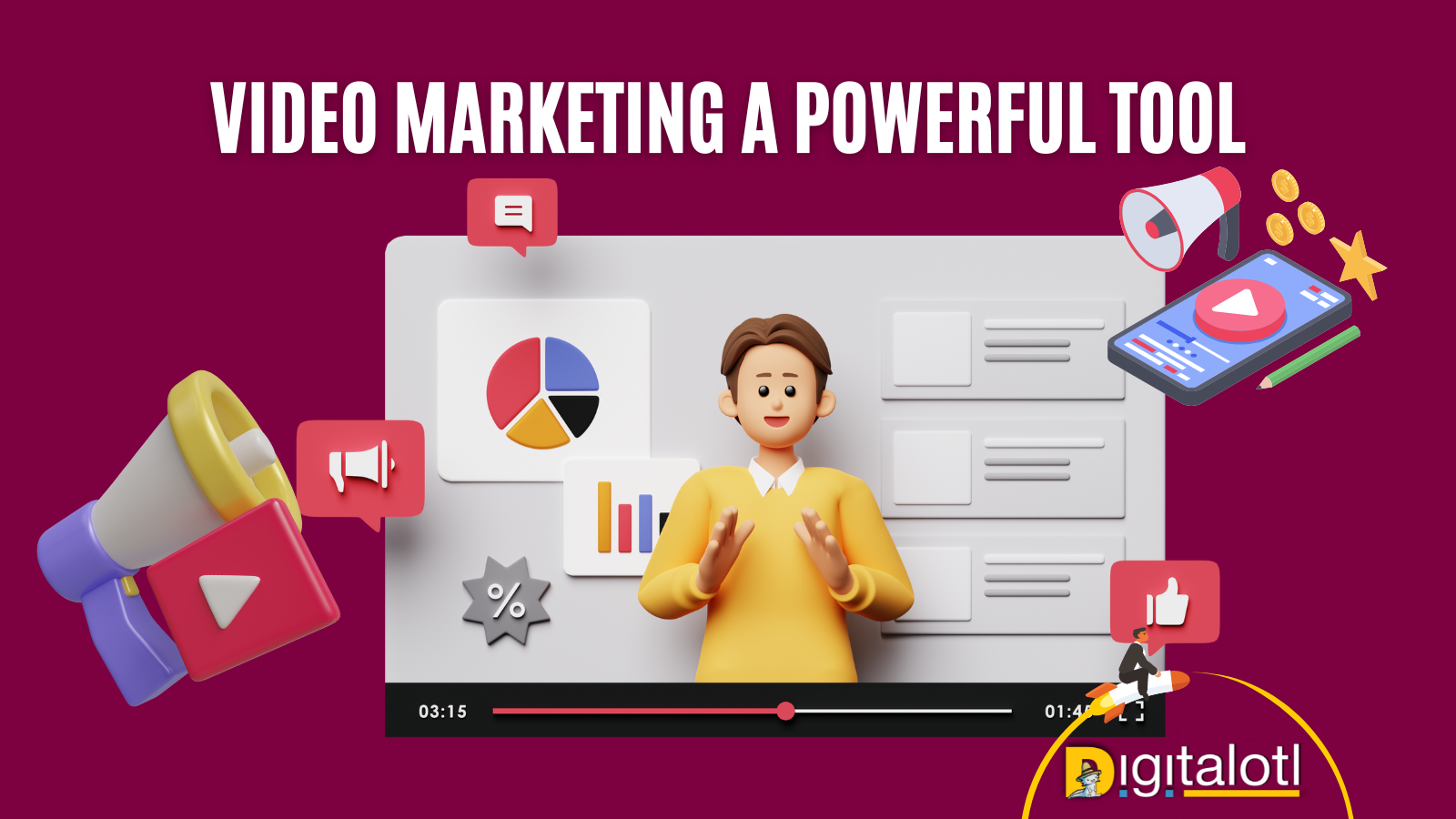In the current era of the digital landscape, characterized by brief attention spans and intense competition, businesses are compelled to employ all possible means to proficiently market their products and services. One such tool that has gained tremendous popularity and proven to be highly effective is video marketing. With its ability to engage, educate, and entertain, video marketing has emerged as a powerful weapon in the arsenal of digital marketing.
Table of contents
The Rise of Video Marketing
The surge in video marketing can be attributed to a multitude of factors. The widespread accessibility of high-speed internet and the prevalence of smartphones have significantly simplified the consumption of video content while on the move, making it more convenient than ever before for individuals to engage with videos. Recent studies indicate that the dominance of video-based content is projected to encompass over 80% of internet traffic by the year 2023. This presents a massive opportunity for businesses to reach their target audience through captivating and shareable videos.
Enhanced Engagement and Brand Awareness

An essential benefit of video marketing lies in its capacity to captivate and maintain viewers’ undivided attention. Unlike traditional text-based content, videos have the power to evoke emotions, tell compelling stories, and deliver information in a visually appealing manner. By leveraging the power of visuals, sound, and storytelling, businesses can create engaging videos that resonate with their audience, resulting in increased brand awareness and recall.
Captivating and Shareable Videos
Videos also have a higher chance of going viral, especially when they are entertaining, informative, or evoke strong emotions. A well-crafted video has the potential to be shared across various social media platforms, extending its reach exponentially. This not only boosts brand visibility but also creates a ripple effect of user-generated content, further enhancing brand credibility and trust.
Improved Search Engine Rankings

Search engine optimization (SEO) holds immense significance in the realm of digital marketing as it actively influences a website’s visibility within search engine results pages (SERPs). While multiple factors influence search rankings, high-quality and engaging content is a key driver of organic traffic. Videos have proven to be highly effective when it comes to content.
Optimizing Videos for Improved Visibility
Search engines like Google prioritize video content in their algorithms, recognizing its popularity among users. By optimizing videos with relevant keywords, compelling titles, and descriptive metadata, businesses can significantly improve their chances of ranking higher in search results. Moreover, hosting videos on platforms like YouTube can also provide an additional avenue for driving traffic to a website, as YouTube itself is the second largest search engine after Google.
Building Trust and Authority
Video marketing allows businesses to showcase their expertise and establish themselves as thought leaders in their respective industries. By creating informative and educational videos, businesses can demonstrate their knowledge, solve problems, and provide value to their audience. This not only helps in building trust and credibility but also positions the business as an authority figure, increasing the likelihood of conversions and long-term customer loyalty.
Effective Conversion and Sales Tool
Videos have the unique ability to evoke emotions and create a personal connection with the audience. By leveraging this emotional appeal, businesses can use videos as a powerful tool for conversion and sales. Product demonstration videos, customer testimonials, and explainer videos can effectively convey the value and benefits of a product or service, leading to higher conversion rates.
Additionally, video marketing also allows businesses to leverage interactive elements such as clickable links, call-to-action overlays, and embedded forms, making it easier for viewers to take the desired action. This seamless integration of marketing messages within videos enhances the user experience and streamlines the path to purchase.
The Importance of Video Content Strategy

While video marketing holds immense potential, it is essential to have a well-defined video content strategy in place to maximize its effectiveness. A video content strategy involves thoughtful planning, creation, distribution, and analysis of videos to achieve specific marketing goals.
Key Elements of a Video Content Strategy
Identify your specific target audience: Gaining a deep understanding of your target audience is essential when designing videos that deeply resonate with their preferences and interests. Conduct market research and develop buyer personas to gain insights into their preferences, interests, and pain points. This knowledge will help you tailor your videos to address their specific needs.
Set Clear Objectives: Define clear objectives for your video content strategy. Whether your objective is to enhance brand visibility, attract more visitors to your website, generate qualified leads, or amplify conversion rates, having specific goals in mind will guide your video creation process and help you to track your success.
Create Compelling and Relevant Content: Invest in creating high-quality videos that provide value to your target audience. Your videos should be informative, entertaining, and aligned with your brand’s messaging. Consider incorporating storytelling techniques to create an emotional connection and make your videos memorable.
Optimize Videos for SEO: As mentioned earlier, optimizing your videos for search engines is crucial for improved visibility. Perform thorough keyword analysis to identify pertinent keywords and seamlessly integrate them within your video titles, descriptions, and tags. This will increase the chances of your videos ranking higher in search results.
Choose the Right Distribution Channels: Determine the platforms where your target audience is most active and optimize your video distribution accordingly. While YouTube is a popular choice, consider other platforms like Facebook, Instagram, LinkedIn, and TikTok based on your audience demographics and preferences.
Engage and Interact with Your Audience: Encourage viewer engagement by incorporating interactive elements in your videos. Prompt viewers to leave comments, ask questions, or share their experiences. Interact with comments and actively participate in discussions to cultivate a vibrant community centered around your brand.
Analyze and Refine: Regularly analyze the performance of your videos using analytics tools. Track and evaluate various metrics such as view counts, engagement rates, click-through rates, and conversion data. This data will provide valuable insights into what works and what can be improved, allowing you to refine your video content strategy over time.
The Future of Video Marketing
With the continuous evolution of technology, video marketing is set to exert even greater influence in the digital landscape. Exciting prospects arise from cutting-edge advancements like virtual reality (VR) and augmented reality (AR), offering immersive and interactive video experiences. Live streaming and 360-degree videos are gaining popularity, providing businesses with new avenues to engage their audience.
Furthermore, the increasing availability of data analytics tools allows businesses to measure the effectiveness of their video marketing efforts more accurately. Metrics like view counts, engagement rates, and click-through rates provide valuable insights that can be used to refine strategies and optimize future video campaigns.
Conclusion
In conclusion, video marketing has emerged as a powerful tool for digital promotion, offering enhanced engagement, improved search rankings, increased brand awareness, and higher conversion rates. By harnessing the power of video content, businesses can effectively captivate their audience, build trust, and drive meaningful results. Therefore, in order to maintain a competitive edge within the dynamic digital landscape, embracing video marketing is not merely a choice, but an indispensable necessity.
Frequently Asked Questions (FAQs)
Q1: What is video marketing, and why is it important for businesses?
Video marketing revolves around leveraging videos as a powerful medium to advertise and showcase products, services, or brands. It is important for businesses because videos have the power to engage and captivate audiences. Through videos, they can convey information in a visually appealing manner and increase brand awareness. Video marketing can boost customer engagement, and drive website traffic. But it can also improve search engine rankings, and ultimately lead to higher conversions and sales.
Q2: How can video marketing help improve search engine rankings?
Video marketing can help improve search engine rankings in several ways. To begin with, search engines such as Google give priority to video content. Thereby increasing its likelihood of appearing in search results. By optimizing videos with relevant keywords, compelling titles, and detailed descriptions, businesses can increase their visibility and organic traffic. Additionally, hosting videos on platforms like YouTube, which is owned by Google, can provide additional opportunities for exposure and improved search rankings.
Q3: What types of videos are most effective for video marketing?
The effectiveness of video marketing depends on the goals and target audience of the business. Nevertheless, several video types have gained widespread usage and demonstrated their effectiveness. That includes product demonstration videos, customer testimonials, explainer videos, educational or how-to videos, and behind-the-scenes footage. These types of videos engage viewers, provide valuable information, and help build trust and credibility.
Q4: Do I need professional equipment and editing software to create videos for marketing purposes?
While professional equipment and editing software can certainly enhance the quality of your videos, they are not always necessary. With advancements in technology, smartphones now have high-quality cameras capable of producing great video content. There are also many user-friendly video editing tools available, some of which are free or have affordable pricing plans. The most important aspect is the content itself. Focus on creating informative, engaging, and relevant videos that resonate with your target audience.
Q5: What methods can be used to measure the success of my video marketing campaigns?
Measuring the success of video marketing campaigns involves analyzing relevant metrics. Platforms like YouTube and social media channels provide analytics tools that offer insights into various metrics. That includes views, watch time, engagement rates, click-through rates, and conversions. By monitoring these metrics, businesses can understand the impact of their videos. And they can identify areas for improvement, and refine their video marketing strategies over time.

